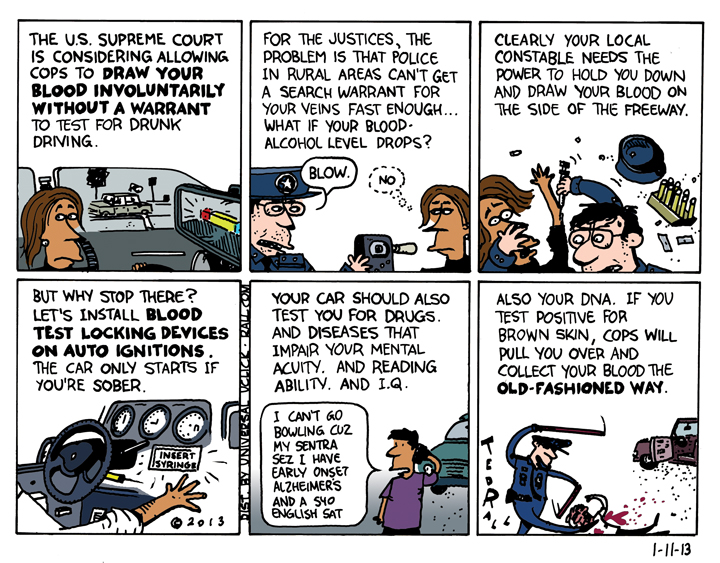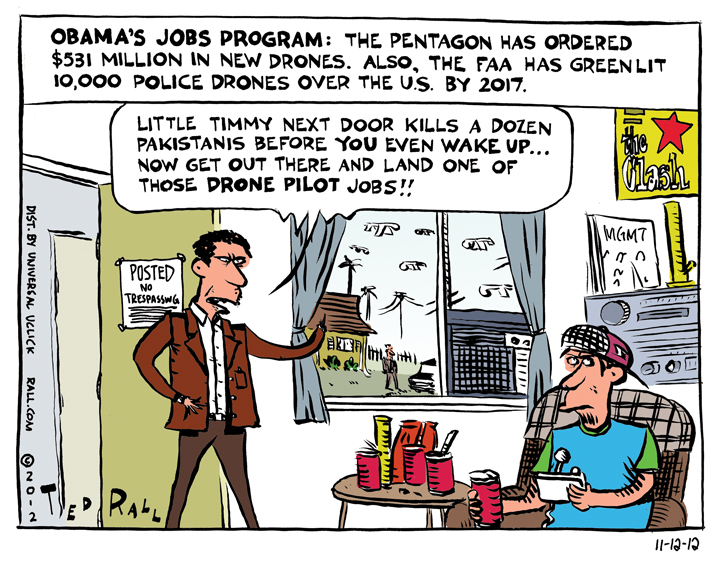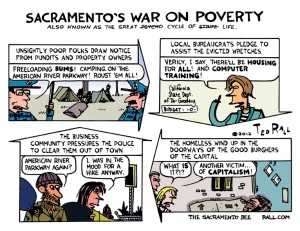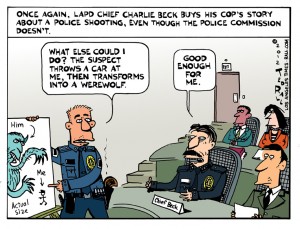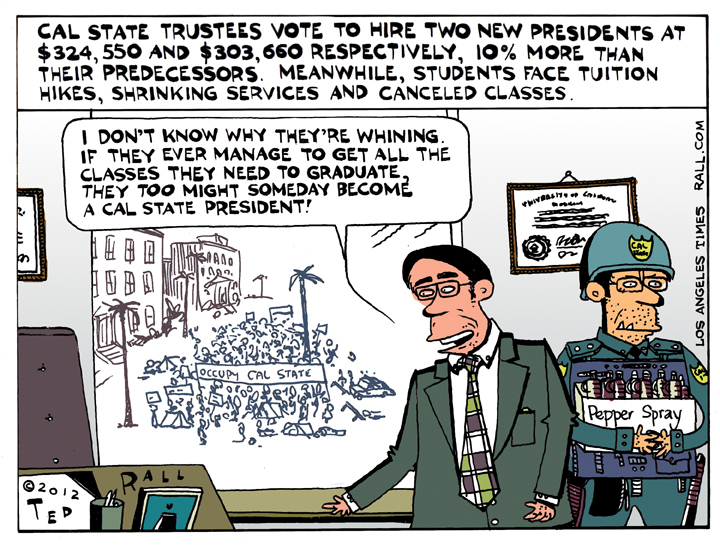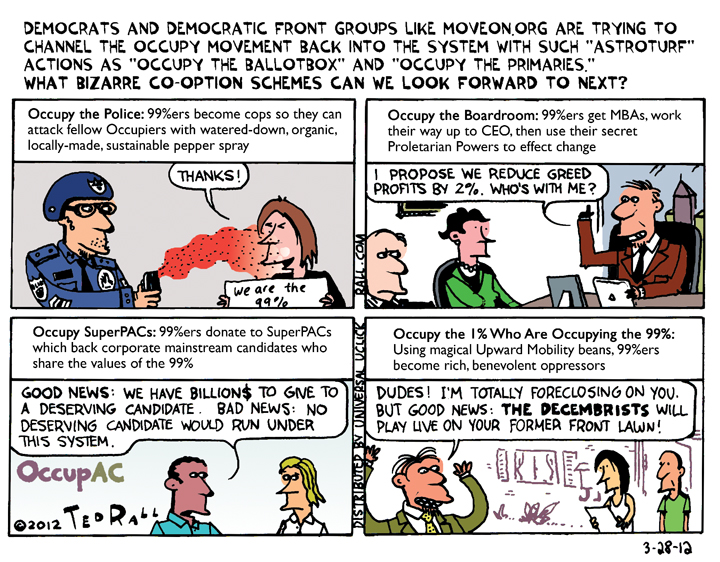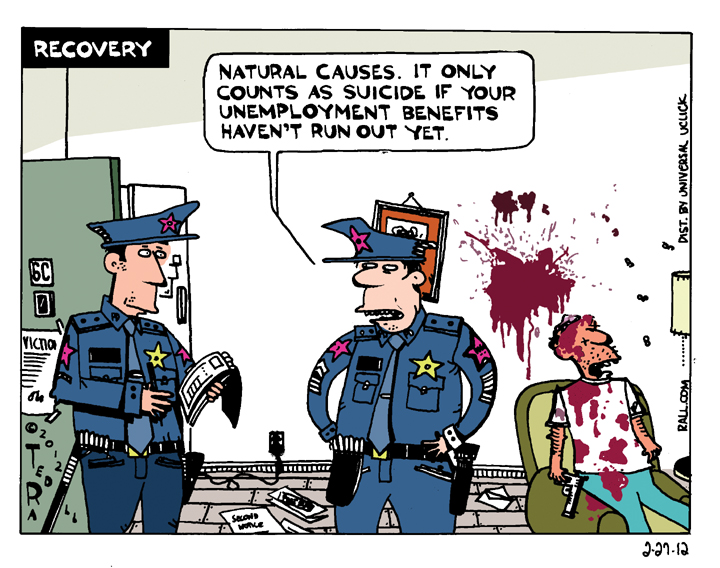The US Supreme Court is currently considering allowing police to draw your blood involuntarily without a warrant in the event that you refuse a breathalyzer test if you are suspected of drunk driving. It is an incredibly invasive procedure, but the authorities and the courts are siding with the cops because, incredibly, they complained that sometimes it is too difficult to get search warrants for your veins and arteries quickly enough before your blood alcohol level dissipates to legal levels.
SYNDICATED COLUMN: Shoot First, Justify Later
Our Police State Does What It Wants, Then Writes a Memo
Imagine that you were the president of United States. Now think what you would do if you or one of your advisers proposed an idea—a great idea, one that solved a big problem—that was radical to the point of possibly crossing the legal line into unconstitutionality.
You’d want to lawyer that sucker, right? After all, the last thing you would want to do is break the law. You wouldn’t want to be accused of running off half-cocked in violation of your inaugural oath to preserve and protect the Constitution. You wouldn’t want to risk a scandal, an investigation, or even impeachment.
Now imagine that you were a chief of police. Again, imagine that you or one of your officers came up with a great new approach for tracking down bad guys, but that the idea was so novel that you couldn’t be sure that arrests made using your new tactic would hold up in court. What would you do? I know what I’d do: I’d consult legal counsel. You probably would too. You’d want to know where you stood so that you and your policemen wouldn’t get into trouble, and your prosecutions would hold up in court.
Check first, act second. Logical. But that’s not how presidents or cops do things in today’s might-makes-right, do-what-you-feel-like-and-come-up-with-a-justification-for-it-later era.
Case in point: Since 2009 President Obama has ordered the CIA and the military to launch more than 300 drone strikes against people in Pakistan, Afghanistan, Yemen, Somalia and other countries, killing more than 2500 people–98% of whom were innocent, and the other 2% of which posed no threat whatsoever to Americans. (Obama killed those 2% as a favor to the U.S.-backed dictatorships they were fighting. According to The Times: “For at least two years in Pakistan, partly because of the CIA’s success in decimating Al Qaeda’s top ranks, most strikes have been directed at militants whose main battle is with the Pakistani authorities or who fight with the Taliban against American troops in Afghanistan.”)
All of these bombings and murders were committed minus the thinnest veneer of legal justification. However, now it has come out that during the final months of the 2012 presidential campaign, when polls showed that Mitt Romney had a chance of winning, Obama and his advisers gathered to begin work on a legal framework for the drone program, a set of rules that would determine how targets are picked.
“There was concern that the levers might no longer be in our hands,” an Obama official told The New York Times, speaking on condition of anonymity (always a good idea when gossiping about a boss with an itchy drone joystick).
“The effort, which would have been rushed to completion by January had Mr. Romney won, will now be finished at a more leisurely pace,” the leaker said.
Obama referenced his retroactive drone legalization project on October 18. “One of the things we’ve got to do is put a legal architecture in place, and we need Congressional help in order to do that, to make sure that not only am I reined in but any president’s reined in terms of some of the decisions that we’re making,” he told Jon Stewart.
Two-thousand five hundred dead men, women and children in, and that’s when they start hanging the legal window dressing? Isn’t this the sort of thing Obama should have thought about back in January of 2009? For that matter, shouldn’t George W. Bush, who originated the drone assassinations after 9/11, been required to put forward some sort of constitutional and legal basis before firing missiles at Afghan wedding parties?
You’d think Congress would take an interest in investigating such a radical expansion of presidential power. But no, in what passes for a democracy that’s supposedly protected from extreme behavior by a system of checks and balances and a separation of powers, the legislative branch took no interest whatsoever in a president—make that two presidents—who secretly claimed the right to murder anyone they please, even a U.S. citizen on American soil, without any accountability whatsoever?
This post-9/11 culture of top-down lawlessness has filtered down to local police departments, many of which have begun routinely searching the cellphones of suspects they arrest. During the Occupy Wall Street protests of fall 2011, many activists reported having their smartphones hooked up to police department computers and drained right in front of them, presumably to mine them for contact information and other data.
Phone companies told Congress that they turned over 1.3 million records in 2011 alone to police departments seeking location data, e-mails, text messages, phone records and other data about their customers—i.e., you and me.
It’s easy to see why cops would want to collect as much information as they can from those they deem to be criminals—although, under the system of laws we used to have, suspects are legally innocent until proven guilty—but how can they possibly justify enacting such a radical new policy before first obtaining authorization from the courts?
Most people want to think their political leaders and law enforcement authorities mean well and are using their powers wisely. And that’s what they want us to believe. In January 2012, for example, President Obama described the drone killings as “a targeted, focused effort at people who are on a list of active terrorists.” But, according to The Times, the program has broadened into something far more sinister and cynical that few Americans would support. For example, “the CIA and the military have carried out ‘signature strikes’ against groups of suspected, unknown militants…for instance, [random] young men toting arms in an area controlled by extremist groups.”
Unchecked power runs wild. Cellphones are one example. When New Yorkers file an NYPD police report that their phone has been stolen, the cops routinely subpoena your records beginning from the day of the theft. Cops are supposed to use the records to find the culprit.
In reality, however, New York’s Finest aren’t exactly pounding the pavement to find your nicked iPhone. What’s they’re really after, reports The Times, is a building its Enterprise Case Management System database, “a trove of telephone logs, all obtained without a court order, that could conceivably be used for any investigative purpose.”
No wonder the Obama Administration’s Department of Justice—which is charged with protecting your rights—says cellphone users have “no reasonable expectation of privacy.”
Why are these guys getting away with murder—literally? Because we’re letting them.
(Ted Rall‘s is the author of “The Book of Obama: How We Went From Hope and Change to the Age of Revolt.” His website is tedrall.com.)
COPYRIGHT 2012 TED RALL
Sacramento Bee Cartoon: Sacramento’s War on Poverty
I did this cartoon for The Sacramento Bee.
Homeless people are being evicted from their encampments along the American River Parkway. This is a cycle people in Sacramento have seen before.
SYNDICATED COLUMN: Prequel to a Beginning
Why Occupy Wall Street Still Matters
It was the middle of September. An ad hoc coalition of political groups, mostly left of center but not all, whose members mostly were young but not all, came together to express their opinions outside the officially approved two-party paradigm.
United by their anger and energy, these people held general assemblies (they called them “sit-ins.”) They marched. Throughout that fall and into part of the following year, they caught the attention of the news media, inspiring activists around the country. In the end, the powers that be did what power powers that be usually do: they sent in the cops. Beaten and swept away in mass arrests, the young activists drifted away. Voters, convinced by the system’s propaganda that the movement threatened law and order, turned to the right.
One year later, it was clear to most that the Free Speech Movement at UC Berkeley had failed.
Students had demanded that school administrators allow political organizations, including civil rights groups, to table and solicit contributions on campus. (In 1964 only the campus Democratic and Republican clubs were allowed to do so.) There was a concession: the acting chancellor grudgingly opened the steps of a single building for open discussion and tables, but only during certain hours. By the fall of 1966, however, UC had a new right-wing president and California was led by a new right-wing governor, Ronald Reagan, who had promised to “clean up the mess in Berkeley.”
Now we understand that the FSM was a prequel to a beginning. The FSM morphed into a campus movement that inspired widespread social unrest of the 1960s that centered on opposition to the Vietnam War. Everything that followed–feminists burning bras, gays rioting after the bust at the Stonewall Inn, America’s withdrawal from Vietnam–had its roots in that “failed” movement.
Keep the “failed” Free Speech Movement in mind as you read and watch this week’s coverage of the anniversary of Occupy. One year after activists set up the first Occupy Wall Street encampments in New York and Washington, D.C., the Occupy movement is described as in “disarray.” Indeed, it’s hard to remember how big OWS was. Were there really more than a thousand Occupations? Did 59% of the American public support OWS when it was barely a month old? What happened?
“I think they’re idiots. They have no agenda,” Robert Nicholson, who works on Wall Street, tells The Los Angeles Times. “They have yet to come out with a policy statement.”
“The movement [grew] too large too quickly. Without leaders or specific demands, what started as a protest against income inequality turned into an amorphous protest against everything wrong with the world,” argues the AP.
I was at Freedom Plaza in D.C. and Zuccotti Park in Manhattan. I’m a member of my local Occupy chapter on Long Island, Occupy the East End. (Yes, we’re still around.) I agree with Mikell Kober of Brooklyn, who was protesting in front of a Bank of America branch. She told a reporter that OWS is “about creating a public space where people could gather and have a conversation about the things that need to change.”
Coming up with a list of demands isn’t the point. Thinking outside the D vs. R box is. Now people know that electoral politics is theater. Real politics is in the streets. For the first time since the Sixties, we know that.
The flaw in Occupy, the seed of its future destruction, was its basic original premise: occupying public space nonviolently.
Occupying nonviolently is an oxymoron. If you decide to be nonviolent, you leave peacefully when the police show up to evict you. Which is what happened last winter to the OWS encampments. If you are determined to occupy–and remain in–public space, you must resort to violence in order to defend yourselves from police violence.
OWS ought to have decided whether it wanted to be nonviolent or whether it wanted to occupy public space. If it chose nonviolence, it could have engaged in acts of resistance–flash mobs, demonstrations, strikes–that did not require setting up and defending encampments.
Also, a political movement is defined more by what it is not than by what it is. OWS was a movement outside of the duopoly, yet many “Occupiers” worked with, and got co-opted by, Democratic Party front groups like MoveOn.org who stole OWS’ “We are the 99%” slogan.Though the physical presence of OWS is a mere shadow of its presence a year ago, the Occupy idea remains colossally important–largely because the two major parties still refuse to engage the biggest problem we face: America’s growing poverty. “I don’t think Occupy itself has an enormous future,” Dr. Mark Naison, a professor at Fordham University, told the Associated Press. “I think that movements energized by Occupy have an enormous future.”
Like the Free Speech movement nearly a half century ago, Occupy is the prequel to the beginning.
Of course, change doesn’t always mean progress and inspiration isn’t always positive. “Reagan’s political career owed a lot to the [FSM] people who used the [UC] campus as a radical base for political activity. It is an irony that helped elect him,” says Earl Cheit, executive vice chancellor at Berkeley from 1965 to 1969.
(Ted Rall‘s new book is “The Book of Obama: How We Went From Hope and Change to the Age of Revolt.” His website is tedrall.com. This column originally appeared at NBCNews.com’s Lean Forward blog.)
COPYRIGHT 2012 TED RALL
Los Angeles Times Cartoon: Making Excuses for Killer Cops
I draw cartoons for The Los Angeles Times about issues related to California and the Southland (metro Los Angeles).
This week: A majority of the five-member Police Commission concludes that a detective who said he shot and killed a man last year was not believable. The chief determined that the shooting was within department policy.
SYNDICATED COLUMN: Every Policeman Is A Licensed Rapist
This week, you can read my column, or watch it!
Strip-Searching is Legal and Democracy is Dead
The text of Justice Kennedy’s majority is cold and bureaucratic. “Every detainee who will be admitted to the general population may be required to undergo a close visual inspection while undressed,” he writes for the five right-wingers in the majority of the Supreme Court.
There’s no looking back now. The United States is officially a police state.
Here are the basics, as reported by The New York Times: “The case decided Monday, Florence v. County of Burlington, No. 10-945, arose from the arrest of Albert W. Florence in New Jersey in 2005. Mr. Florence was in the passenger seat of his BMW when a state trooper pulled his wife, April, over for speeding. A records search revealed an outstanding warrant for Mr. Florence’s arrest based on an unpaid fine. (The information was wrong; the fine had been paid.) Mr. Florence was held for a week in jails in Burlington and Essex Counties, and he was strip-searched in each. There is some dispute about the details, but general agreement that he was made to stand naked in front of a guard who required him to move intimate parts of his body. The guards did not touch him.”
“Turn around,” Florence later recalled his jailers ordering him. “Squat and cough. Spread your cheeks.”
A court motivated by fairness would have declared this conduct unconstitutional. Fair-minded people would have ordered the New Jersey municipality to empty its bank accounts and turn them over to the man it humiliated. Everyone involved—the police, county officials—ought to have been fired and charged with torture.
Not this court, the U.S. Supreme Court led by John Roberts. Besotted by the sick logic of paranoia and preemption that has poisoned us since 9/11, it ruled that what happened to Albert Florence was perfectly OK. The cops’ conduct was legal.
Now “officials may strip-search people arrested for any offense, however minor.”
If you get arrested at an antiwar protest, the police can strip-search you. If you’re pulled over for a minor traffic infraction, as was the plaintiff in this case. For setting off fireworks on the Fourth of July.
Humiliation is the law of the land.
The Court heard examples of people who were strip-searched “after being arrested for driving with a noisy muffler, failing to use a turn signal and riding a bicycle without an audible bell.” They considered amicus briefs by nuns and other “women who were strip-searched during periods of lactation or menstruation.”
Body-cavity searches are now legal for anyone arrested for any crime, no matter how minor. As of April 2, 2012, finger-rape is the law of the land.
Think it won’t happen to you? 14 million Americans are arrested annually. One in three Americans under age 23 has been arrested. It happened to me a couple of years ago, for a suspended drivers license. Except that it wasn’t really suspended. I was lucky. My cops weren’t perverts. They didn’t want a lookie-loo at my private parts.
How did we get here? Preemptive logic.
Saddam Hussein is a bad man. He hates the United States. What if he has weapons of mass destruction? What if he used them against us, or gave them to terrorists who would? Can’t take that chance.
We don’t need evidence in order to justify bombing and invading Iraq. We have fear and the logic of preemption.
The logic of preemption flails, targeting anyone and everyone. A single plane passenger sets his shoes on fire. He never came close to causing real damage, but now everyone has to take off their shoes before boarding a plane. Infants. Old people. Veterans whose limbs got blown off in Iraq. Everyone.
Can’t take chances. What if your toddler is a member of Al Kidda?
The logic of preemption is indiscriminate. What if terrorists are stupid enough to use phones and emails to plot their dastardly schemes? We’d want to know, right? In the old days before 9/11, officials who suspected a person of criminal conduct went to a judge to obtain a wiretapping warrant.
Now we’re paranoid. And the government is power-hungry. So government officials and their media lapdogs are exploiting our fear and paranoia, openly admitting that they listen to everyone‘s phone calls and read everyone‘s emails. Can’t take chances. Gotta cover all the bases.
What about the Fourth Amendment’s prohibition against unreasonable searches and seizures? Quaint relics of a time before the police state. Like the Geneva Conventions.
Here comes Justice Kennedy, amping up the perverse logic of preemption. Responding to the nasty cases of the finger-raped nun and the humiliated women on their period, Kennedy pointed out that “people detained for minor offenses can turn out to be the most devious and dangerous criminals.” Timothy McVeigh, who blew up the federal building in Oklahoma City in 1995, was pulled over for driving without a license plate. “One of the terrorists involved in the Sept. 11 attacks was stopped and ticketed for speeding just two days before hijacking Flight 93,” he wrote, continuing with the observation that San Francisco cops “have discovered contraband hidden in body cavities of people arrested for trespassing, public nuisance and shoplifting.”
No doubt about it: If you search every car and frisk every pedestrian and break down the door of every house and apartment in America, you will find lots of people up to no good. You will discover meth labs and bombs and maybe even terrorists plotting to blow up things. But who is the bigger danger: a drug dealer, a terrorist, or a terrorist government?
This summer will be ugly. Cops will arrest thousands of protesters who belong to the Occupy Wall Street movement, which is fighting corruption and greed and trying to improve our lives. Now that police have the right to strip and molest demonstrators, you can count on horrible abuses. Cops always go too far.
Note to people about to be arrested: pop a laxative before they slip on the flexicuffs.
I don’t know about you, but I would rather live in a country that respects rights and freedoms more than the paranoid madness of preemption. In the old America where I grew up, we lived with the possibility that some individuals were evil. Now we face the absolute certainty that every policeman is a fully licensed finger-rapist.
(Ted Rall’s next book is “The Book of Obama: How We Went From Hope and Change to the Age of Revolt,” out May 22. His website is tedrall.com.)
Los Angeles Times Cartoon: Cal State Presidents Cash In
I draw cartoons for The Los Angeles Times. This week’s offering: Cal State trustees have voted to hire two new presidents at high salaries, 10% more than their predecessors. Meanwhile, students face class cancellations and budget cuts.

